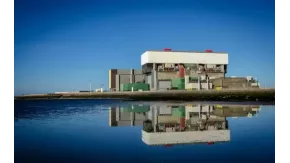
More progress on exciting hydrogen plans for Heysham 2
Bold plans to use nuclear generated hydrogen to decarbonise a key British industry, have taken another huge step forward.
Today the Department for Energy Security and Net Zero has announced £6.1m for the Bay Hydrogen Hub – Hydrogen4Hanson scheme, a figure that will be matched by the project partners. The funding is from the government’s £1 billion Net Zero Innovation Portfolio (NZIP), which provides funding for low-carbon technologies and systems.
The hub, a consortium made up of EDF, construction materials producer Hanson, National Nuclear Laboratory (NNL), and Vulcan Burners, is aiming to pilot a project in which nuclear derived hydrogen is used to decarbonise asphalt and cement production.
The Government and industry funding, which combined will exceed £15m, will go towards developing a final design for the hydrogen production, distribution and end use technology and for exploring the full costs and delivery plans.
Rachael Glaving, Commercial Director at EDF, said: “For decades nuclear power in the UK has provided zero-carbon electricity to the grid and helped to constrain the nation’s emissions, collectively saving more than 700m tonnes of carbon dioxide going to the atmosphere.
“But we know nuclear power can do even more to drive the nation towards decarbonisation. Our hope is that this project shows industries that are dependent on fossil fuels, as well as the nuclear sector, that by working together we can build a lower carbon future for industry and confirm the UK’s place as a global decarbonisation technology leader.”
The Bay Hydrogen Hub proposes to build a solid oxide electrolysis cell (SOEC) electrolyser at Heysham 2 Power Station in Lancashire. The station, which generates 1.25Gw of electricity, will divert small quantities of electricity and steam, generated by the nuclear process, to an SOEC built onsite. This would create hydrogen, which would then be transported in modern high-capacity tankers, to Hanson’s Criggion asphalt plant in North Wales.
There the hydrogen would be used to fuel the industrial processes which presently use a mix of liquid fossil fuel. At present, no facility in the world has used hydrogen as a fuel for asphalt production. Earlier in 2023, a feasibility study demonstrated the significant benefit the project would bring in proving how nuclear could power hydrogen electrolysis.
Gareth Headdock, Vice President of Government and New Build, National Nuclear Laboratory, said: "This project places the UK as a global leader in the development of nuclear enabled hydrogen. We are really excited to see this new application of nuclear energy, along with the increasing investment in advanced nuclear. As we invest in the next generation of scientists and engineers, the Bay Hydrogen Hub is building the skills we need for our hydrogen future.”
Simon Willis, CEO Hanson UK, said: “Nuclear power derived hydrogen has the potential to be a complete game-changer for decarbonising asphalt and cement production. Our involvement in the Bay Hydrogen Hub project underscores our commitment to lead the way by investing in cutting edge technologies to prove they can deliver in real-world situations and help us meet our net zero goals.
“Hanson has already successfully shown that hydrogen can be used as part of a net zero fuel mix at our cement works in Ribblesdale, Lancashire, but its use as a fuel at an asphalt site has not yet been physically demonstrated anywhere in the world. It’s an exciting time and we are hopeful that the project will demonstrate another key step forward towards the decarbonisation of our industry.”
Over the coming months, the project partners will develop the full designs for the electrolyser and scope and cost all works that will be required at Heysham 2 to take the scheme forward. Once this work is concluded, a decision will be made which could see construction, and supporting physical works, begin at the power station in early 2024.
See the original story here
News by Category
- BECBC
- Cumbria
- Nuclear
- Social Value
- Professional Services
- Clean Energy
- Business
- People
- Government
- BECBC Member News
